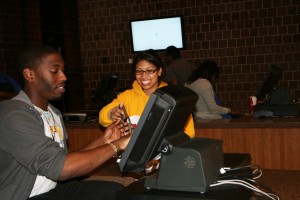On Sept. 1 of this year, hotly-contested contract negotiations began between UR Service Workers and University management. Just as these negotiations seemed to be nearing a boiling point, the service workers approved a new two year contract late Monday, Oct. 11.
The new contracts were approved by a vote of 115 to zero by River Campus employees and 285 to 138 by workers at Strong Memorial Hospital.
The existing contract expired on Sept. 25, and it had to be extended twice while talks about revisions to the contract continued. During this period, 16 major bargaining sessions between the two parties were held, which were overseen by a federal mediator.
As of Friday, Oct. 8, there was no end to the negotiations in sight. When meetings recessed late that afternoon, the employees were still dissatisfied with the University’s contract proposal, which included no pay raise in the contract’s first year, a 1 percent pay raise in October 2011 and didn’t provide enough payment to the employees’ benefits fund to ensure that their benefits would be safe.
According to Chief Negotiator for both River Campus and Strong/UR Medical Center Service Employees Bruce Popper, the employees never threatened to go on strike. They did plan, however, to begin taking more drastic measures to swing negotiations in their favor over Meliora Weekend if an agreement had not been reached by that time.
Employees planned to hand out leaflets at various Meliora Weekend events to drum up support for their cause, and they filed federal notices that they would begin informational picketing at the Medical Center starting Friday, Oct. 15, if no consensus was reached. Additionally, a march from the Medical Center to UR President Joel Seligman’s office was slated for last Friday, and over 1,300 people were originally invited to it over Facebook.
In their opening statement at the first contract meeting on Sept. 1, the service employees emphasized their concerns about how impoverished parts of Rochester are, and that the University, as the sixth largest private employer in New York state, has the capability to change this by increasing the pay of the lowest paid UR employees.
“Like the city of Rochester, income disparity is increasing at UR, and with it the social consequences that follow,” they said. “The gap between service workers and those in the top brackets continues to widen.”
Concessions made by the University allowed many of the service workers’ proposals from initial negotiations to become realities in the new contract. According to a media release, the approved contract includes 100 percent employer payment of health care premiums, with union-sponsored health plans, as well as full funding for the training and upgrading fund and the child care program that goes along with it.
Popper felt that covering the costs of health insurance was perhaps the greatest compromise on the University’s end.
“Because of very rapidly rising costs and new federal mandates, we needed a lot of money to keep the plan free to employees,” he said. “It was certainly a compromise for UR to agree to such a large increase for our benefits.”
He also pointed out, however, that the service employees were not entirely pleased with every aspect of their new contract.
Most significantly, the employees would have liked to have seen a larger pay raise. According to Popper, UR management originally wanted to freeze the service employees’ pay, but the employees were able to convince the University not to penalize the lowest-paid workers.
“Average pay for a full-time worker is just above $27,000 per year,” Popper said. “Although that’s a lot better than many similar jobs at other employers, it is still very difficult to raise a family in Rochester on that income.”
The new contract affects about 1,500 UR employees, including patient care technicians, nursing unit secretaries, surgical assistants, environmental and facilities maintenance employees, food service, transportation and materials processing staff.
Fleming is a member of the class of 2013.




